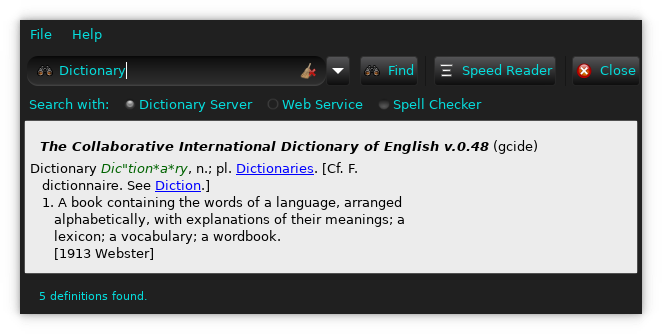
Wordsmith on the Linux command line with dict
The dict command on Linux is useful for writers to access a plethora of dictionaries and synonyms for their word choices.
As a writer, I frequently need to determine the correct spelling or definition of words. I also need to use a thesaurus to find alternate words that may have a somewhat different connotation than the one I might otherwise use. Because I frequently use the Linux command line and text-mode tools to do much of my work, it makes sense to use a command line dictionary.
I really like using the command line for a number of reasons, the primary one being that it is more efficient for me. It is also far more comprehensive than any one or multiple physical paper dictionaries, could ever be. I have been using the Linux dict command for many years and I have come to depend on it.
Install dict on Linux
The dict program is not installed by default on Fedora, but it’s easy to install. Here is how to install it on Fedora and similar programs:
$ sudo dnf install dictdOn Debian and similar programs, you must also install the dictionary definitions:
$ sudo apt install dictd dict-gcideNo additional configuration is required. The minimalistic /usr/share/doc/dictd/dict1.conf file specifies the remote server for the dictionary databases. This tool uses the Dictionary Server Protocol (DICT) on port 2628.
Use dict on Linux
In a terminal session as a non-root user, type dict <word> to get a list of definitions from one or more dictionaries and the thesaurus. For example, look up the word memory this way.
$ dict memory | less
6 definitions found
From The Collaborative International Dictionary of English v.0.48 [gcide]:
Memory \Mem"o*ry\, n.; pl. {Memories}. [OE. memorie, OF.
memoire, memorie, F. m['e]moire, L. memoria, fr. memor
mindful; cf. mora delay. Cf. {Demur}, {Martyr}, {Memoir},
{Remember}.]
[1913 Webster]
1. The faculty of the mind by which it retains the knowledge
of previous thoughts, impressions, or events.
[1913 Webster]
Memory is the purveyor of reason. --Rambler.
[1913 Webster]
2. The reach and positiveness with which a person can
remember; the strength and trustworthiness of one's power
to reach and represent or to recall the past; as, his
memory was never wrong.
[1913 Webster]
<SNIP>
From WordNet (r) 3.0 (2006) [wn]:
memory
n 1: something that is remembered; "search as he would, the
memory was lost"
2: the cognitive processes whereby past experience is
remembered; "he can do it from memory"; "he enjoyed
remembering his father" [syn: {memory}, {remembering}]
3: the power of retaining and recalling past experience; "he had
<SNIP>
From Moby Thesaurus II by Grady Ward, 1.0 [moby-thesaurus]:
78 Moby Thesaurus words for "memory":
RAM, anamnesis, anniversaries, archetypal pattern, archetype,
awareness, celebrating, celebration, ceremony, cognizance,
commemoration, consciousness, disk memory, dressing ship,
<SNIP>
From The Free On-line Dictionary of Computing (30 December 2018) [foldoc]:
memory
<storage> These days, usually used synonymously with {Random
Access Memory} or {Read-Only Memory}, but in the general sense
it can be any device that can hold {data} in
{machine-readable} format.
(1996-05-25)
From Bouvier's Law Dictionary, Revised 6th Ed (1856) [bouvier]:
MEMORY, TIME OF. According to the English common law, which has been altered
by 2 & 3 Wm. IV., c. 71, the time of memory commenced from the reign ofI have cut large sections of this result to save space while leaving enough information to provide an idea of what typical results look like. You can also look up multi-word phrases by enclosing them in quotes, either double or single.
$ dict "air gapped"Dictionaries
The dict command uses several online dictionaries, including legal and technical ones. Dictionaries are also available for many languages. You can list the available dictionary databases as shown here:
$ dict -D | less
Databases available:
gcide The Collaborative International Dictionary of English v.0.48
wn WordNet (r) 3.0 (2006)
moby-thesaurus Moby Thesaurus II by Grady Ward, 1.0
elements The Elements (07Nov00)
vera V.E.R.A. -- Virtual Entity of Relevant Acronyms (February 2016)
jargon The Jargon File (version 4.4.7, 29 Dec 2003)
foldoc The Free On-line Dictionary of Computing (30 December 2018)
easton Easton's 1897 Bible Dictionary
hitchcock Hitchcock's Bible Names Dictionary (late 1800's)
bouvier Bouvier's Law Dictionary, Revised 6th Ed (1856)
devil The Devil's Dictionary (1881-1906)
world02 CIA World Factbook 2002
gaz2k-counties U.S. Gazetteer Counties (2000)
gaz2k-places U.S. Gazetteer Places (2000)
gaz2k-zips U.S. Gazetteer Zip Code Tabulation Areas (2000)
fd-hrv-eng Croatian-English FreeDict Dictionary ver. 0.1.2
fd-fin-por suomi-português FreeDict+WikDict dictionary ver. 2018.09.13
fd-fin-bul suomi-български език FreeDict+WikDict dictionary ver. 2018.09.13
fd-fra-bul français-български език FreeDict+WikDict dictionary ver. 2018.09.13
fd-deu-swe Deutsch-Svenska FreeDict+WikDict dictionary ver. 2018.09.13
<SNIP>You can specify individual dictionaries with the -d option:
$ dict -d gcideEndmost Dictum
Sometimes using words found in the thesaurus is not the best approach to writing as it can obfuscate your meaning. But I do find that the dict command can be immensely useful in choosing the best word for a specific meaning. It also ensures that the words I use are spelled correctly.
There’s a dearth of information about dict. The URL http://www.dict.org/ provides only a web-based interface to the dictionaries. The man page covers syntax. But the command is a useful and fun command to have handy. I admit that after discovering the dict command I spent many hours of the day just trying different things to see what the result would be. I was the kid who read the encyclopedia and dictionary. Yes, I was that kid. In addition to being a useful tool when writing or reading, dict can also be a fun tool to satisfy a bit of curiosity.